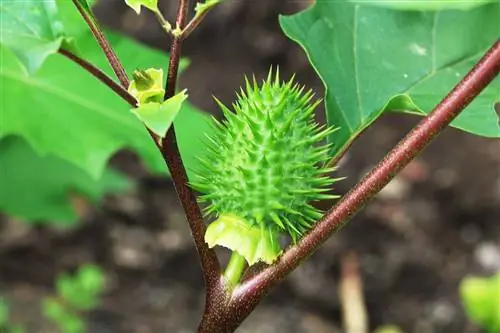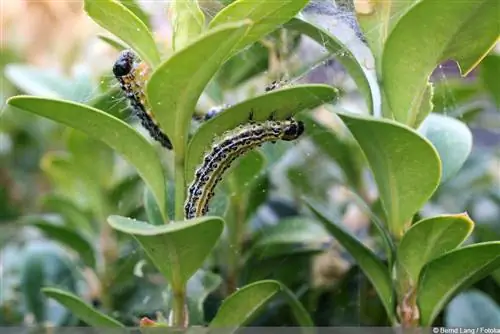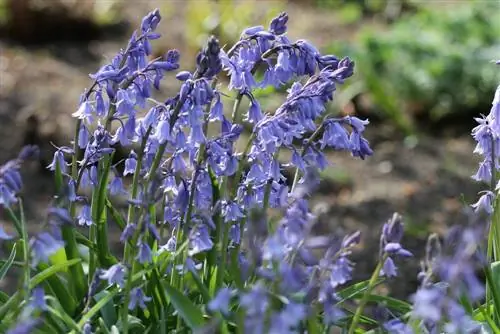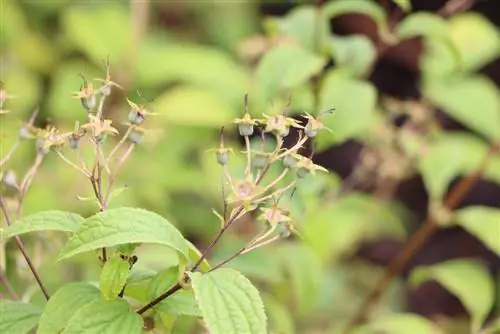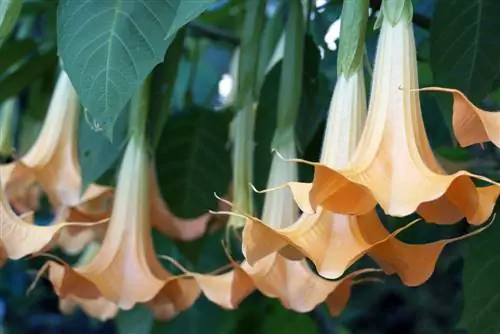- Author admin caroline@plants-knowledge.com.
- Public 2023-12-17 03:39.
- Last modified 2025-01-24 12:45.
With its large funnel flowers, toothed leaves and thorny fruits, the datura definitely stands out. Despite everything, it is poisonous to humans as well as domestic and farm animals.
Duty to report or not?
Even though Datura is a highly poisonous plant, it is not one of the species that is subject to reporting requirements. It could even be grown in the home garden, although this is something to consider carefully, especially if you have small children and/or pets. If you want to remove the datura from the garden and prevent it from spreading, you should protect yourself accordingly. By the way, you can dispose of it in the compost, because the toxic alkaloids it contains decompose as the plant dries out.
Toxicity
Even if the name “apple” suggests otherwise, the datura is highly poisonous in all parts of the plant and is under no circumstances suitable for consumption. It is not without reason that it is also called sleeping herb, madweed, witch's herb or devil's apple. All of the approximately 20 species worldwide are poisonous, with the common or white datura (Datura stramonium) being particularly common in Central Europe. Even consuming small amounts of the plant can be life-threatening.
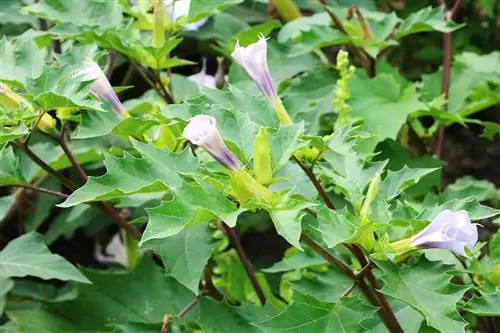
Effective ingredients
The high toxicity is due to the so-called tropane alkaloids atropine, hyoscyamine and scopolamine. Plants produce these highly effective alkaloids to protect themselves from predators. They are also found in many other nightshade plants such as belladonna and henbane, which is related to datura. They are found in all parts of the plant. The highest concentration is in the roots and seeds. In addition, this plant contains other toxic substances in smaller quantities, but no less dangerous.
Tip:
The use of leaves and seeds as intoxicants is also often discussed. Here too, due to the high toxicity and poor controllability, even a small dose can cause severe symptoms of poisoning.
Symptoms of poisoning
Datura poisoning is not something to be trifled with.
With people
As already mentioned, the consumption or accidental consumption of small amounts of plant material or seeds can have fatal consequences, which in the worst case scenario can be fatal. Abusing this plant as a drug can also quickly lead to addiction. The signs of poisoning can vary greatly depending on the dosage and the person. They are usually neurological in nature or affect the cardiovascular system.
- Skin irritation, increased temperature
- dry mouth, thirst
- Light sensitivity, dilated pupils
- Vision and balance problems
- restlessness, accelerated pulse, increased excitement
- Swallowing and speech disorders
- Blockage of the urinary tract (bladder blockage)
- Nausea, vomiting
- Muscle twitches, cramps, movement disorders
- Cardiac arrhythmias, unconsciousness, respiratory paralysis
- Clouded consciousness and/or hallucinations
- Confusion, hallucination
- Anxiety, panic attacks, loss of control
- Crying fits, paranoia, fear of death
- Aggressiveness, quarrelsomeness, tantrums, coma
The first symptoms appear between five minutes and an hour after poisoning. They can last up to two days and, in the worst case, can lead to death as a result of respiratory paralysis. Cultivating this plant in the home garden is therefore by no means recommended.
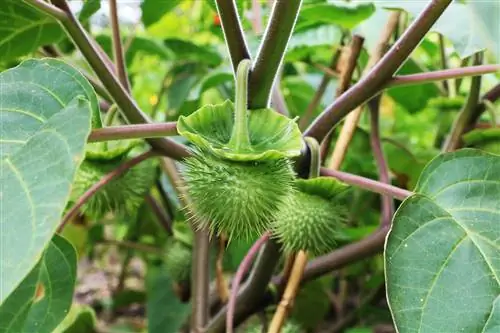
Tip:
Consuming alcohol at the same time can make poisoning even worse. In small children, simply biting a leaf can cause symptoms of poisoning and a rise in temperature.
For pets and farm animals
This plant is highly poisonous, especially the flowers and seeds, not only for humans, but also for our beloved pets. Even though most animals are less sensitive to alkaloids, poisoning is possible. It can manifest itself in dizziness, cramps, restlessness and visual disturbances. Datura is poisonous to livestock both fresh and when dried. If an animal shows these or similar symptoms or has obviously nibbled on the plant, a veterinarian should be consulted as quickly as possible.
First Aid
If poisoning is present or even suspected, there is a risk to life, which requires immediate intensive medical care from a doctor. Home remedies of any kind are not indicated here. Therefore, at the first signs or suspicion of Datura poisoning, you should consult a doctor or clinic as quickly as possible. If there is no clinic nearby, the emergency doctor must be called. If in doubt, you should also contact the poison control center. Until a doctor arrives, the affected person should be observed and vital bodily functions should be constantly monitored.
Tip:
If animals show symptoms of poisoning, they should be taken to a veterinarian immediately.

